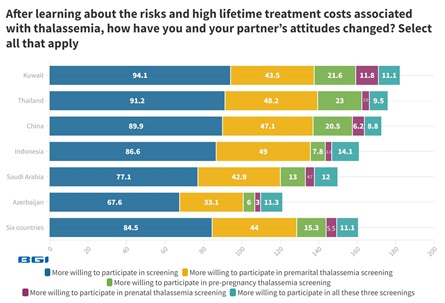|
|
94.1 percent of Kuwaiti
women consider Thalassemia
screening after learning
about health risks
(Riyadh, Saudi
Arabia) -
To facilitate greater
understanding of
thalassemia, a hereditary
hemoglobinopathy,
BGI
Genomics has released its
2023 Global State of Thalassemia
Awareness Report. This
report assesses the level of
knowledge and attitudes
related to the associated
health risks, thalassemia
carrier screening, and
genetic counseling for
carriers. 1,847 female
respondents from six
countries with high
thalassemia prevalence were
surveyed: Azerbaijan, China,
Indonesia, Kuwait, Saudi
Arabia, and Thailand.
94.1% of Kuwaiti women
consider screening after
learning about associated
thalassemia health risks and
costs which is higher than
the global average of 84.5%.
If both partners are
thalassemia carriers, 38.1%
of Kuwaiti women can
persuade their partners to
seek genetic counseling and
consider preimplantation
genetic diagnosis (PGD)
which is lower than the
global average of 50.9%.
Survey findings highlighted
the urgent need to improve
awareness, address barriers,
and enhance access to
screening:
Most don't
know much about thalassemia:
70.5% of women did not know
much about thalassemia
symptoms and the associated
health risks, with another
14.4% indicating they never
heard about thalassemia.
Accessibility matters:
Hospitals or agencies nearby
that provide screening
services (43.1%), cost of
screening services (38.1%),
and before getting married
or having children (35.3%)
are the top reasons that
affect the willingness to
undergo thalassemia
screening.
Thalassemia
carriers are more open to
genetic counseling: If both
partners are thalassemia
carriers, 50.8% of women can
persuade their partners to
seek genetic counseling and
consider PGD. If women have
obtained information about
thalassemia from health
awareness programs, this
percentage rises to 59.5%.
Dr. Zhiyu Peng, BGI Genomics
Deputy GM, notes, "This
survey shows that enhancing
awareness and accessibility
are an important first step
in thalassemia control
programs. Region-specific
screening and treatment
programs, customized to
align with local healthcare
resources and cultural
values, are also vital to
identify thalassemia
patients and carriers."
Dr. Androulla Eleftheriou,
Thalassaemia International
Federation Executive
Director, comments,
"Enhancing awareness is a
crucial first step in
promoting individual
behavior changes and policy
reforms, ultimately leading
to improved prevention,
control, and management of
thalassemia. Screening
services – a key component
of any effective national
control programme – needs to
consider cultural and
socio-economic backgrounds.
We welcome BGI Genomics
efforts and reaffirm our
commitment to further
expanding thalassemia
awareness on a global
scale."
BGI Genomics
is headquartered in
Shenzhen, China. The company has pioneered
thalassemia genetic testing
services based on
next-generation sequencing
(NGS) technology since 2013.
 PRINT
THIS ARTICLE
PRINT
THIS ARTICLE
|



